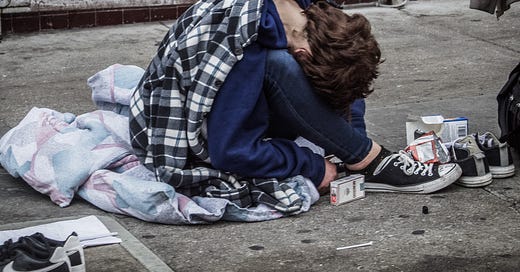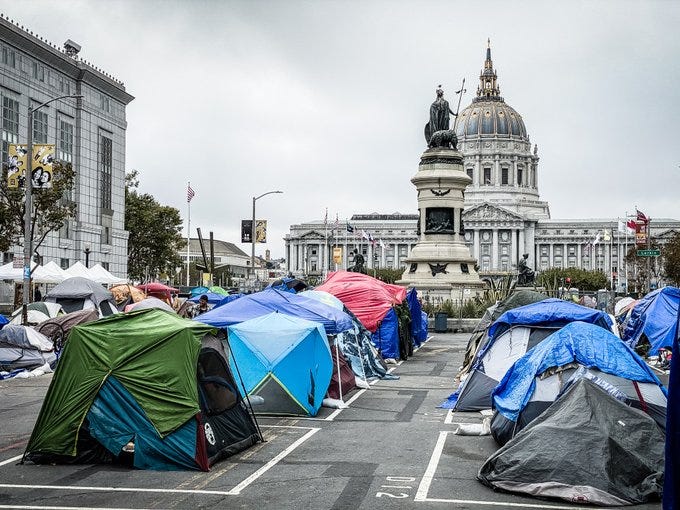In the late 1990s and early 2000s, I worked with a group of friends and colleagues to advocate drug decriminalization, harm reduction, and criminal justice reform. I helped progressive Congressperson Maxine Waters organize civil rights leaders to advocate for needle exchange so that heroin users wouldn’t get HIV-AIDS. I fought for the treatment of drug addiction as a public health problem not a criminal justice one. And we demanded that housing be given to the homeless without regard for their own struggles with drugs.
Our intentions were good. We thought it was irrational to criminalize the distribution of clean needles to drug users when doing so had proven to save lives. We were upset about mass incarceration, particularly of African Americans and Latinos, for nonviolent drug offenses. And we believed that the approach European nations like the Netherlands and Portugal had taken to decriminalize drugs, and expand drug treatment, was the right one.
But it’s obvious now that we were wrong. Over the last 20 years the U.S. liberalized drug laws. During that time, deaths from illicit drugs rose from 17,000 to 93,000. Two and a half times more people die from illicit drug use than from car accidents; five times more die from drugs than homicide. Many of those people are homeless and die alone in the hotel rooms and apartment units given away as part of the harm reduction-based “Housing First” approach to homelessness. Others are children found dead by their parents on the floors of their rooms.
Many progressives today say the problem is that we didn’t go far enough, and to some extent they are right. A big factor behind rising drug deaths has been the contamination of cocaine, heroin, and counterfeit prescription opioids with fentanyl. Others say that concerns over rising drug deaths are misplaced, and that alcohol and tobacco kill more people than illicit drugs.
But drug deaths were rising in the U.S. long before the arrival of fentanyl, and most of the people who die from tobacco and alcohol do so in old age, not instantly, like they do when they are poisoned or overdose. Of the nearly 90,000 people in the U.S. who die of alcohol-related causes annually, just 2,200 die immediately from acute alcohol poisoning.
What about mass incarceration? It’s true that nearly half of the people in federal prisons are there for nonviolent drug offenses. But there are eight times more people in state prisons than federal prisons, and just 14 percent of people in state prisons are there for nonviolent drug offenses and just 4 percent for nonviolent possession. Half of state prisoners are there for murder, rape, robbery and other violent offenses.
While it’s true that both Netherlands and Portugal reduced criminal penalties, both nations still ban drug dealing, arrest drug users, and sentence dealers and users to prison or rehabilitation. “If somebody in Portugal started injecting heroin in public,” I asked the head of drug policy in that country, “what would happen to them?” He said, without hesitation, “They would be arrested.”
And being arrested is sometimes what addicts need. “I am a big fan of mandated stuff,” said Victoria Westbrook. “I don't recommend it as a way to get your life together, but getting indicted by the Feds worked for me. I wouldn't have done this without them.” Today Victoria is working for the San Francisco city government to integrate ex-convicts back into society.
But people in progressive cities are today shouted down for even suggesting a role for law enforcement. “Anytime a person says, ‘Maybe the police and the health care system could work together?’ or, ‘Maybe we could try some probation or low-level arrests,’ there’s an enormous outcry,” said Stanford addiction specialist Keith Humphreys. “‘No! That’s the war on drugs! The police have no role in this! Let’s open up some more services and people will come in and use them voluntarily!’”
Why is that? Why, in the midst of the worst drug death crisis in world history, and the examples of Portugal and Netherlands, are progressives still opposed to shutting down the street fentanyl markets in places like San Francisco that are killing people?
We Care A Lot
photo credit: author
There are many financial interests that make money from the drug crisis and so it’s reasonable to ask whether progressive inaction stems from political donations from addiction, homelessness, and service providers. California spends more on mental health than any other state but saw its homeless population rise 31 percent even as it declined 18 percent in the rest of the U.S. San Francisco spends significantly more on cash welfare and housing for the homeless than other cities but has one of the worst homeless and drug death crises, per capita.
But we progressives who fought to change drug laws and attitudes were not primarily motivated by money. Sure, we needed George Soros and other wealthy individuals to support our work. But we could have made more money doing other things, and Soros and others have nothing to gain financially from drug decriminalization. The same goes for homelessness. The most influential Housing First advocates work in non-profits and universities.
Is it because so many progressives who fought for decriminalization themselves used drugs? Everybody I knew in that period, myself included, smoked marijuana, drank alcohol, and experimented with psychedelics and occasionally with harder drugs. Several of the donors who supported our work were known to smoke marijuana.
But I saw no evidence that advocates for drug decriminalization and harm reduction used illicit drugs at a higher rate than the rest of the population. Some used them less and showed far greater awareness of the harms of drugs, including addiction, than many other people I have met, likely due to their higher socio-economic status as much as their specific knowledge of the issue.
And the core motivation of the people I worked with was ideological. Many people, including many progressives, were libertarian, and fundamentally believed the government did not have a right to tell able-bodied adults what drugs they could and could not use. But many more, myself included, were upset by mass incarceration, and the ways in which incarceration destroys families, disproportionately African American and Latino ones.
Our views were too simplistic and wrong. Many things undermine families and communities, of all colors, well before anyone is incarcerated, including drugs and the crime and violence associated with them. And, violent communities attract the drug trade more than the drug trade makes communities violent, both scholars and journalists find.
But mostly we were too emotional. Progressives hold two moral values particularly deeply: caring and fairness. “Across many scales, surveys, and political controversies,” notes the psychologist Jonathan Haidt, “liberals turn out to be more disturbed by signs of violence and suffering, compared to conservatives, and especially to libertarians.”
The problem is that, in the process of valuing care so much, progressives abandon other important values, argue Haidt and other researchers in a field called Moral Foundations Theory. While progressives (“liberal” and “very liberal” people) hold the values of Caring, Fairness, and Liberty, they tend to reject the values of Sanctity, Authority, and Loyalty as wrong. Because these values are so deeply held, often subconsciously, Moral Foundations Theory explains well why so many progressives and conservatives today view each other as not merely uninformed but immoral.







